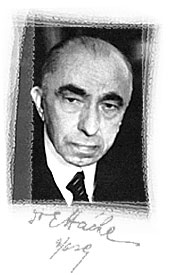- Emil Hácha
Infobox_President
name=Emil Hácha

order=3rd
office=President of Czechoslovakia
term_start=30 November 1938
term_end=13 May 1945
predecessor=Jan Syrový (acting)
successor=Edvard Beneš
birth_date=birth date|1872|7|12|df=y
birth_place=Trhové Sviny ,Bohemia ,Austria-Hungary
death_date=death date and age|1945|6|26|1872|7|12|df=y
death_place=Prague ,Czechoslovakia
party=
spouse=Marie Háchová (1873 - 1938)
profession =Lawyer |Emil Hácha (12 July 1872 – 26 June 1945) was a Czech lawyer, the third President of
Czechoslovakia from 1938 to 1945. From March 1939, he presided under the GermanProtectorate of Bohemia and Moravia .Judicial career
Emil Hácha was born on 12 July 1872 in a town of
Trhové Sviny . He graduated from a secondary school inČeské Budějovice and then applied for the law faculty at theUniversity of Prague . After finishing his studies in 1896 (JUDr.) he worked for the Country Committee of the Kingdom ofBohemia inPrague (a self-government body, quite limited power). Shortly after the outbreak of theWorld War I , he became a judge at the Supreme Administrative Court inVienna (the court was responsible forCisleithania ). He metFerdinand Pantůček there.After the
Treaty of Versailles , Pantůček became President of the Supreme Administrative Court of theRepublic of Czechoslovakia in Prague, and Hácha became a judge (1918) and Deputy President (1919) of the court. After Pantůček's death in 1925 he was chosen by T. G. Masaryk as his successor. He became one of the most notable lawyers in Czechoslovakia, a specialist in the Englishcommon law andinternational law . He was also a translator of English literature (most notably theThree Men in a Boat byJerome K. Jerome ), collector of art and a poet (his book "Omyly a přeludy" was published in 1939 anonymously, and again, this time under his name, in 2001 [ [http://referaty-seminarky.cz/hacha-emil/ Emil Hácha, in Czech] ] ). He also became a member of the Legislative Council.President of Czechoslovakia
After the
Treaty of Munich and emigration of presidentEdvard Beneš he was chosen as his successor on 30 November 1938. He was chosen because of his Catholicism and conservatism and because of not being involved in any government that led to the partition of the country. During a night meeting withAdolf Hitler andHermann Göring inBerlin on between 14 and 15 of March, 1939 he was threatened with aerial bombardment of Prague [Dokumenty z historie československé politiky 1939–1945. II., Prague 1966, p. 420–422] and pressured to sign a document accepting incorporation of Bohemia and Moravia intoGermany even though he did not consult the parliament beforehand.In the evening of 14 March, Hitler invited President Hácha to the Reich Chancellery in
Berlin . Hitler deliberately kept him waiting for hours to humiliate him, watching movies in his room; comedy films directed byJoseph Goebbels . Finally, at 1:30am on 15 March 1939, Hitler saw Hácha. He told Hácha that as they were speaking, the German army was about to invade Czechoslovakia. All of Czechoslovakia's defences; barbed wire and pillboxes, were now under German control following theMunich Agreement in September of the previous year. The country was virtually surrounded by Germany on three fronts, and threatening to bombPrague , Hácha agreed to "sign Czechoslovakia away" to Germany.After the occupation of the remnants of
Czechoslovakia on 16 March, he retained his office as President but was forced to swear an oath to Hitler andKonstantin von Neurath , the newly-chosen "Protector of Bohemia and Moravia", in November 1939. He protested against the German policies andGermanization of former Czechoslovakia; however, that was to little effect. He also secretly cooperated with the exiled government ofEdvard Beneš .His situation changed after
Reinhard Heydrich was appointed Deputy Protector of Bohemia and Moravia, as Neurath was considered not harsh enough by Hitler. Hácha lost any influence over the matters in his country and became a puppet. Many of his colleagues and friends were arrested (including the Prime MinisterAlois Eliáš ) and shot or sent to theconcentration camp s. Because of the terror campaign started by Heydrich, Hácha felt that the collaboration with the occupants was the only way he could help his people and nation.According to postwar historians, because of Hácha's poor health, he was not responsible for his actions, given his old age and failing mental faculties. In any case, his influence on German policies was close to none since at least 1941 and almost certainly earlier. On 9 May 1945, Prague fell to the Soviets during the
Prague Offensive . Emil Hácha was arrested on 14 May and transferred immediately to a prison hospital. He died there on 26 June. After his death, he was buried at first in an unmarked grave at theVinohrady cemetery but now there is a marker over his body.Legacy
He is regarded by many as one of the most tragic characters of all Czechoslovak history. By others he is seen as one of the most disappointing characters. He collaborated with Hitler's Nazi regime and became the "State President" in 1939, when Czechoslovakia was overtaken by Germany and transformed into the Protectorate of Bohemia and Moravia and the Slovak Republic. Historians have judged him as a man that tried to save as much of Czechoslovakia's freedom as was possible given the limited options open to him and his own failing health.
References
External links
*en icon [http://www.yale.edu/lawweb/avalon/wwii/yellow/ylbk077.htm Dramatic account by French diplomats of Emil Hácha's reluctance to sign over Bohemia and Moravia to Germany]
*cs icon [http://www.fronta.cz/index.php?dokument=28 Hácha's report on the 15 March meeting in Berlin]
*en icon [http://www.radio.cz/en/article/68024 The complex legacy of the president many would prefer to forget]
Wikimedia Foundation. 2010.
